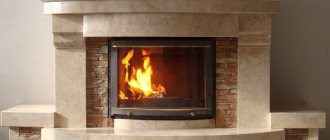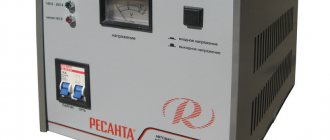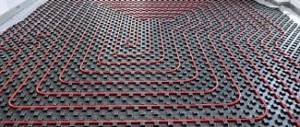Features of oil heaters
Oil-type heaters are also called radiators. They are easy to use (just plug them in), produce a lot of heat and are not susceptible to electrical faults. Traditionally they are used in houses and apartments.
Structurally, the radiator consists of the following elements:
- A reservoir with a heating element that is filled with mineral oil.
- Rheostat for temperature control.
- Horizontal position sensors (at a significant angle of inclination, the equipment simply turns off).
- Case parts.
- Compartment for storing the power cable.
The advantages of these devices are:
- Low cost.
- Ease of movement (modern models are equipped with wheels).
- Quiet operation.
- Does not dry out the air.
The disadvantages are low safety, the need for control, large dimensions, high energy consumption and the risk of oil spillage.
Oil heater or convector - which is better: consumer reviews
You definitely need to pay attention to what the owners of both equipment write. According to many, the control of heaters is equal, but the cost of devices using mineral oil is 20-30% less, which is a significant advantage. At the same time, it is noted that convectors with air purification are more preferable for indoor use, as they improve its climate. If such a function is absent, then there is no significant difference in terms of environmental friendliness. Based on all of the above, we can conclude that both some and other types of heaters are good.
Convector: pros and cons
Heating a country house with convectors in the absence of central heating is a solution that has recently become more common. Such units are also used in ordinary houses with low heating, apartments, cafes, hotels and offices.
Operating principle of the electric convector:
- Cold air enters the device from below through natural circulation.
- Passing through the heating element, the air heats up and rises.
- Heated air masses give off heat to the body elements and exit from above through a special grille.
The advantages of an electric convector are:
- Mobility and possibility of permanent installation.
- Uniform air heating.
- Safety and ease of use.
- Fast heating.
The disadvantages include the following features:
- High price of the product.
- Dry the air.
Convector device
In an electric convector, cold air entering through holes in the lower part of the device is heated by a heating element - a heating element. The heated air rises and enters the room through the upper openings. Constant circulation of warm air in the apartment is ensured. This ensures 95% of the heat transfer of the device and only the remaining 5% of the heat is released by the heated case.
Operating principle of a convector heater
Price
Depending on the additional functions of the device and mounting methods, its price also varies - from 3,000 rubles and above. Electric converters can be:
- floor;
- wall-mounted;
- baseboards.
Energy-saving models and convectors equipped with the following functions will cost more:
- preventing condensation formation;
- formation of pathogenic fungal spores.
The cost of energy-saving modifications is also higher.
Advantages and disadvantages
The advantages of devices of this type are:
- fast heating of the room (twice as fast as an oil radiator or battery);
- possibility of temperature control;
- fire safety;
- attractive design.
The disadvantages include:
- the possibility of drafts;
- raising dust particles into the air;
- violation of the microclimate (dries out the room).
Important! Experts do not recommend turning on an electric convector in a room where there are children or sick or weakened people.
Innovative infrared convective heaters
In search of an answer to the question of whether to choose an oil heater or a convector, many people pay attention to devices such as infrared-convective heaters. They are an invention of recent years, combining the properties of an electric convector and an infrared installation:
- The heating element generates thermal energy.
- Heat is transferred to the environment through the body surface.
- Part of the warm air is removed through a special grille through natural circulation.
The units use two heating elements - convection and IR panel.
The advantages of ICO are:
- Multitasking.
- Long service life.
- Safety.
- Ergonomics.
- Quickly heats a room even with a large area.
The disadvantage is the ability to “eat” oxygen. In addition, this technique is very expensive.
Comparison table between convector and oil heater characteristics
| Criterion | Convector | Oil radiator | Which heater is better - convector (K) or oil (M) |
| Dimensions and weight | Compact, thin and light weight | Massive in size, heavy | TO |
| Location in the room | Stationary ones are attached to the wall with anchors. Mobile phones can be placed anywhere | You can place it anywhere, but there are restrictions: you cannot place it near furniture or carpets. | TO |
| Electricity consumption | Consume 25% less oil. | Long-term heating requires more electricity, less economical | TO |
| User comfort | Quickly heats the air, heating it evenly throughout the room due to convection air circulation. | It takes a long time to heat, the heat is concentrated near the unit, which causes temperature fluctuations. | TO |
| Average operating period | 10-15 years | 5-7 years | TO |
| Control | Setting temperature and power conditions manually or electronically. | Setting temperature and power conditions manually or electronically. | K, M |
| Environmental friendliness | They raise dust up and do not allow it to settle | They raise dust up and do not allow it to settle | — |
| Heating time | It heats up quickly enough. | It warms up for a long time. Fan models provide faster heating | K, M |
| Heating time | It heats up quickly enough. | It warms up for a long time. Models with a fan provide faster heating. | K, M |
| Safety | The surface does not overheat. Allowed to be left unattended. There is an auto shut-off function. | The surface becomes very hot, there is a risk of hot oil pouring out, and if used incorrectly, it is explosive. | TO |
| Price | 20-25% more expensive than a radiator. | Reasonable price | M |
About baseboard and floor convectors
For users thinking about which heater to choose, we would like to offer additional information for consideration. The fact is that on the modern market you can find another type of electric convectors designed for heating premises. These are heaters that are installed around the perimeter of the room instead of standard baseboards or built into the floors. Their design and principle of operation are completely identical to wall-mounted models, the difference is in the size and shape of the body.
Note. The use of baseboard and floor heaters involves performing a number of installation and connection works.
Such devices are well suited for an apartment or private house with high interior requirements. One or more heaters are controlled using a thermostat located on a remote control panel, which also includes other useful heating programming functions. To get the desired effect, several of these heaters should be installed in the room.
conclusions
What is more effective?
Which is better - an electric convector or an oil heater - in terms of heat distribution efficiency? An oil appliance mainly heats the part of the room in which it is located. A convection heater distributes heat evenly without causing significant temperature changes, so it is more efficient.
Which will heat faster?
Oil installations require more time to warm up, since first the heating element is heated using electricity, then the heating element heats the oil, and then the housing is heated, releasing heat into the room. In a convector, the heating element immediately heats the air, so the process of heating the room goes faster. If the oil heater is equipped with fans, it will heat the air much faster than any convector unit.
Which is safer?
Oil radiators heat up to a very high temperature, so it is easy to get burned if you touch it. The exception is models equipped with a protective casing. In addition, such equipment should not be left unattended. Convection devices only heat up to 60 degrees and are equipped with a sensor that turns off the equipment in case of excessive heating. Which convector heater is better in terms of fire safety depends on the quality of the product and its technical characteristics (maximum amount of electricity and voltage consumed, the presence of various sensors, automatic shutdown, etc.).
What dries the air?
The issue of comfort in the room plays a big role. Buyers are interested in whether the convector dries the air or not, as well as how the same process occurs with oil-based units. Convection dries the air, while oil units only heat it up.
Which is cheaper?
When purchasing heating equipment, every consumer is interested in which heater is more economical. This can be determined based on two criteria: the cost of the product and the amount of electricity consumed. In terms of the price of the equipment itself, oil radiators are cheaper. In terms of electricity consumption, it is difficult to say which heater is more economical - oil or convector. It all depends on the duration of use. Given the same amount of use, a radiator will use more electricity than a convection heater.
Only you can decide what to buy – a convector or an oil heater. What will be better in each individual case depends on the parameters you require. However, in many respects, convector-type heaters are superior to oil heaters. To choose which convector heater to buy, you need to select the power of the device (based on the calculation of 1 kW per 10 m2 of room), decide on the desired manufacturer and the price acceptable to you.
Comparison of advantages and disadvantages
To choose an oil heater or a convector for heating your home, you need to compare the pros and cons of each type of device. This is not so easy to do, since there is much in common between them, in particular the operating principle. Let’s compare the main characteristics, and for clarity, we’ll put the results in the table:
Note. In order to speed up the heating of the room, some manufacturers equip the oil radiator with a blower fan.
Having analyzed all the characteristics, we present some conclusions that will help you decide which heater is better to choose:
- In terms of efficiency, all devices are the same. If heating a room of 20 m2 requires an average of 2 kW of heat, then you can take any of the presented devices with a small power reserve - 2.5 kW. To distribute heat evenly, it is recommended to allocate this power to 2 radiators, rather than buying one large one;
- Oil heaters have the lowest price, but they are inferior to convectors in appearance and heating speed. At the same time, these devices do not require installation and are easy to clean;
- Wall-mounted convectors are more expensive than oil radiators, but they look more presentable and heat the room a little faster. Requires simple installation work;
- the most expensive option is baseboard convectors. They need to be mounted, wired and connected, which also costs a pretty penny. It is also difficult to clean the parts of the devices from dust. But with high requirements for the interior of rooms, a better solution cannot be found.
Important. Statements that an oil radiator or convector heater dries the air or raises dust, to put it mildly, are untrue. These phenomena occur, but to such an insignificant extent that it makes no sense to take them into account. Such statements are an advertising ploy by sellers selling certain electrical appliances for heating.











